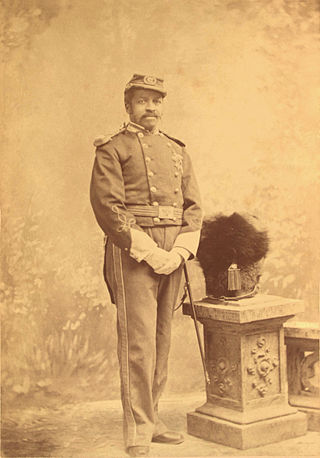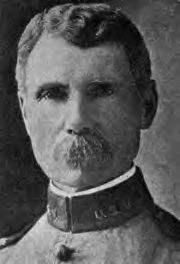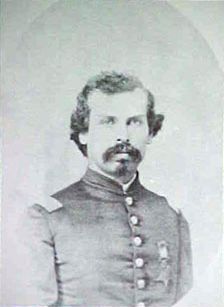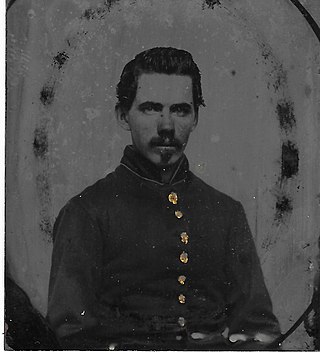
The Battle of Ezra Church, also known as the Battle of Ezra Chapel and the Battle of the Poor House saw Union Army forces under Major General William T. Sherman fight Confederate States Army troops led by Lieutenant General John B. Hood in Fulton County, Georgia during the Atlanta campaign in the American Civil War. Sherman sent Oliver Otis Howard's Union Army of the Tennessee circling around the west side of Atlanta with the purpose of cutting the Macon and Western Railroad. Hood countered the move by sending two corps commanded by Stephen D. Lee and Alexander P. Stewart to block the move. Before Howard's troops reached the railroad, the Confederates launched several attacks on them that were repulsed with heavy losses. Despite the tactical defeat, the Confederates prevented their foes from blocking the railroad.

Christian Abraham Fleetwood, was an African American non-commissioned officer in the United States Army, a commissioned officer in the D.C. National Guard, an editor, a musician, and a government official. He received the Medal of Honor for his actions during the American Civil War. He wrote "The Negro As a Soldier" for the Negro Congress at the Cotton States and International Exposition in Atlanta, Georgia held in November 1895.

David Sloane Stanley was a Union Army general during the American Civil War. Stanley took part in the Second Battle of Corinth and the Battle of Stones River as a division commander. He was later made a corps commander under William Tecumseh Sherman and sent to Tennessee to oppose John Bell Hood's Army of Tennessee. At a critical moment in the Battle of Franklin, he saved part of George D. Wagner’s division from destruction, earning America's highest military decoration, the Medal of Honor. Later he explored the Yellowstone River, and his favorable reports encouraged settlement of this region.

Theodore Schwan was a Union Army officer during the American Civil War who received the Medal of Honor for his actions at the Battle of Peebles' Farm. He also served with distinction during the Spanish–American and Philippine–American Wars.
Pinkerton Ross Vaughn Sr. was a United States Marine Corps sergeant during the American Civil War. He was awarded the nation's highest military decoration for valor—the Medal of Honor, for his actions aboard the USS Mississippi during a battle with Confederate artillery batteries at Port Hudson, Louisiana on March 14, 1863. Vaughn is one of the first two Marines to be awarded the Medal of Honor in the history of the Marine Corps.
David Southard was a Union Army soldier during the American Civil War who received America's highest military decoration the Medal of Honor for his actions at the Battle of Sailors Creek

Robert Alexander Pinn was an African American Union Army soldier during the American Civil War and a recipient of America's highest military decoration—the Medal of Honor—for his actions at the Battle of Chaffin's Farm.
Edward Ratcliff was an African American Union Army soldier during the American Civil War and a recipient of America's highest military decoration—the Medal of Honor—for his actions at the Battle of Chaffin's Farm.
The 37th Ohio Infantry Regiment was a Union Army regiment, composed of German-Americans, in the American Civil War. It was organized in the fall of 1861, under Colonel Edward Siber, and served in the Kanawha Valley until December 1862. It joined the Union army operating against Vicksburg, Mississippi, in January 1863, and participated in the various engagements of the siege. After the fall of that stronghold it was moved across Tennessee from Memphis to Chattanooga, and took part in operations of the 15th Corps, subsequent to, and at the taking of Atlanta, Georgia. It then followed the fortunes of that well-known corps until the reaching of Washington, D.C. From Louisville, Kentucky, it went with the 2nd Division of the Corps to Little Rock, Arkansas, and was there mustered out in August 1865.
The 30th Ohio Infantry Regiment was an infantry regiment in the Union Army during the American Civil War.

Elihu Harlam Mason was a Union Army soldier in the American Civil War and a recipient of the United States military's highest decoration, the Medal of Honor, for his actions in the Great Locomotive Chase.
The 116th Illinois Volunteer Infantry was an infantry regiment in the Union Army during the American Civil War.

Wilson Wright Brown was a soldier and recipient of the Medal of Honor for his role in the Great Locomotive Chase during the American Civil War.
Private Harry Clay Davis was an American soldier who fought in the American Civil War. Davis received the country's highest award for bravery during combat, the Medal of Honor, for his action during the Battle of Ezra Church in Atlanta, Georgia on 28 July 1864. He was honored with the award on 2 December 1864.
William Garrett was a Manx-born American soldier who fought in the American Civil War. Garrett received his country's highest award for bravery during combat, the Medal of Honor. Garrett's medal was won for his actions in the Battle of Nashville in Nashville, Tennessee, on December 16, 1864. He was honored with the award on February 24, 1865.

Mark Wood was an American soldier who fought in the American Civil War. Wood received his country's highest award for bravery during combat, the Medal of Honor, for his role in the celebrated Great Locomotive Chase. Wood and a fellow participant in the raid, John A. Wilson, were captured close to Union lines in Stevenson, Alabama after they abandoned The General. Wood and Wilson escaped from captivity and after sailing down the Chattahoochee River, were rescued by a Union ship. He was honored with the award on May 12, 1865.

Howell B. Treat was an American soldier who fought in the American Civil War. He received his country's highest award for bravery during combat, the Medal of Honor. Treat's medal was won when he risked his life to save a wounded comrade at Buzzard's Roost on May 11, 1864. He was honored with the award on February 20, 1884.

James B. Thompson was an American soldier who fought in the American Civil War. Thompson received his country's highest award for bravery during combat, the Medal of Honor. Thompson's medal was won for capturing the flag of the Confederate's 15th Georgia Infantry at the Battle of Gettysburg on July 3, 1863. He was honored with the award on December 1, 1864.

William Garrett Whitney was an American Medal of Honor recipient who served in the Union Army during the American Civil War and was awarded for his actions during the Battle of Chickamauga. He served in Company B, 11th Michigan Infantry, enlisting August 24, 1861 as a sergeant. Whitney was 21 years old at the time of enlistment and was from Allen, Michigan. There were at least 53 men who served from Allen.
William Haliday Williams was an American soldier who fought in the American Civil War. Williams received his country's highest award for bravery during combat, the Medal of Honor. Williams's medal was won for his heroism at the Battle of Peachtree Creek in Georgia on July 20, 1864. He was honored with the award on June 19, 1894.










